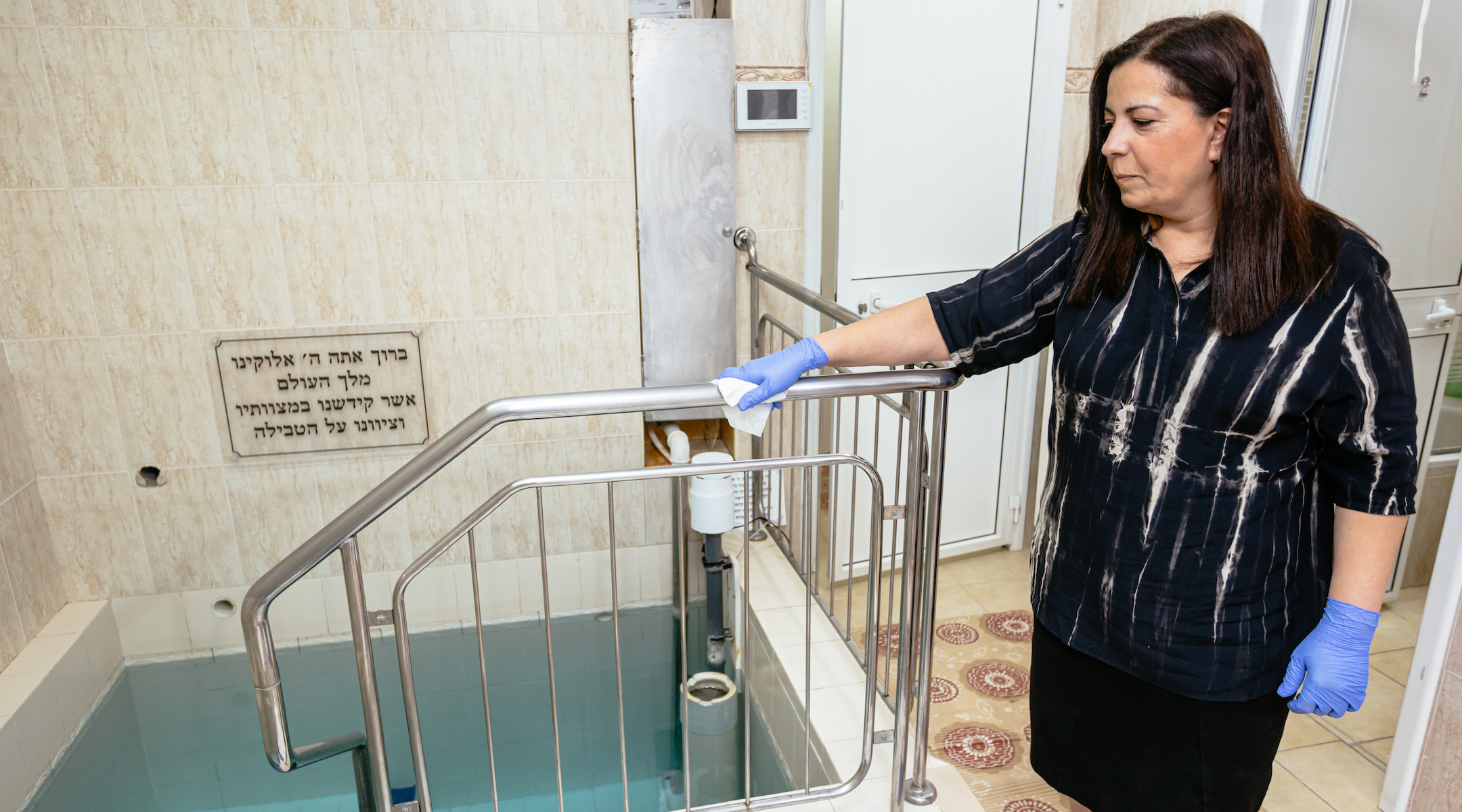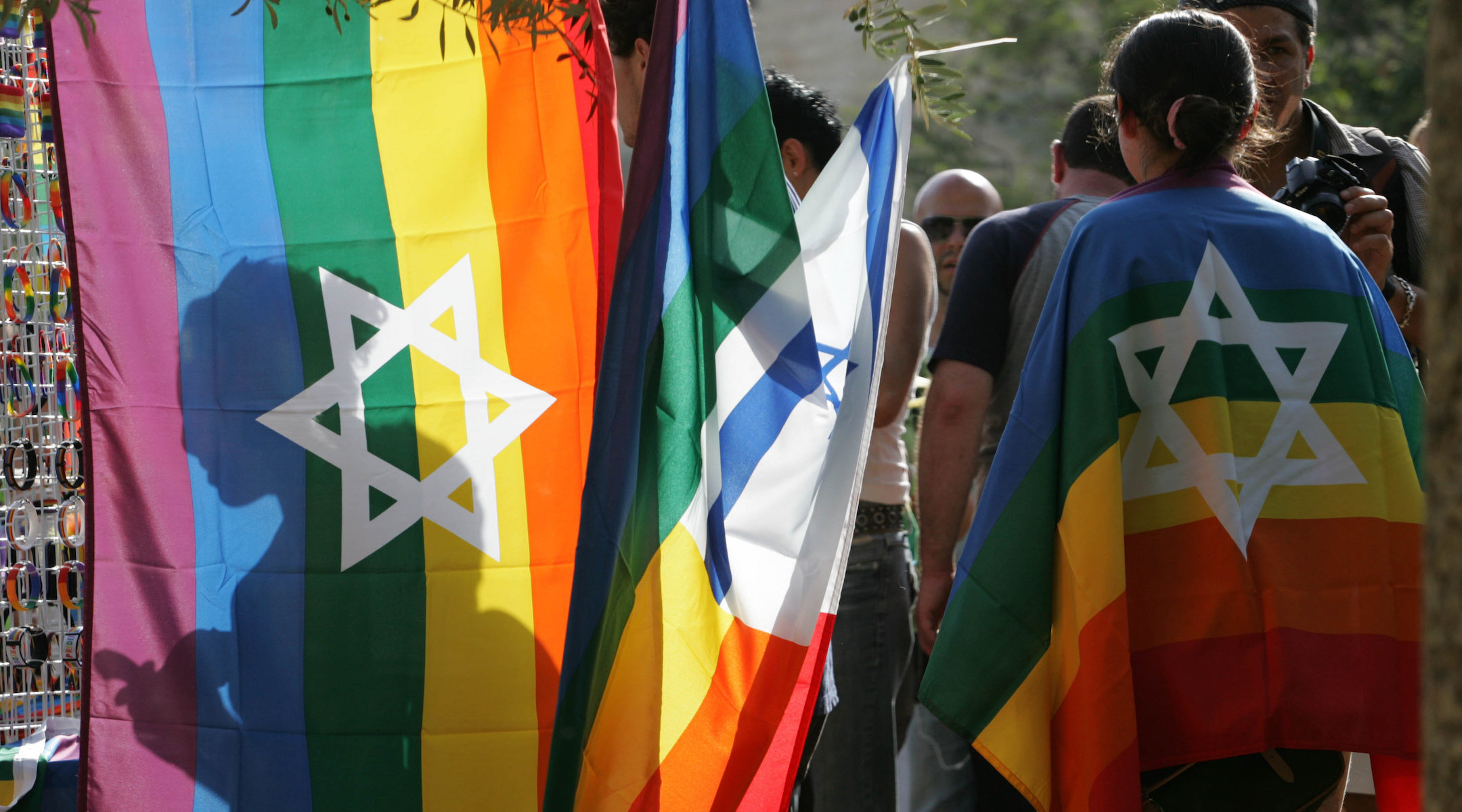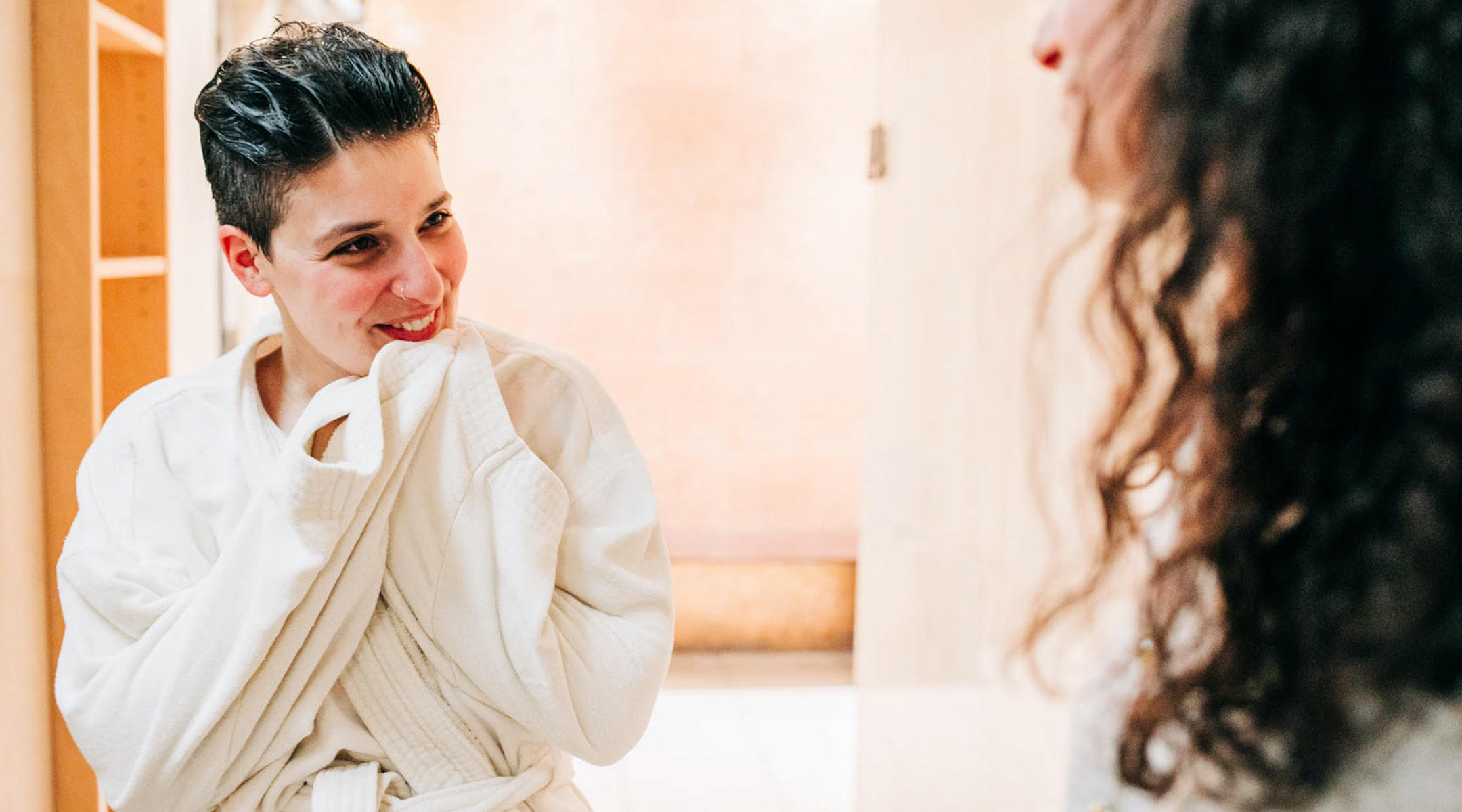(JTA) — Like many observant Jewish women, Sandy Tapnack visits the mikvah at the end of her period in observance of the laws of family purity.
There, she cleans herself thoroughly before immersing in the ritual bath three times while an attendant watches in a practice that Jewish women have followed for thousands of years to ready themselves to reunite physically with their husbands.
But unlike most mikvah users, the spouse waiting for Tapnack at home is a woman — a fact that leaves the 36-year-old attorney nervous during her visits to the Orthodox bath near her home.
“There’s kind of a fear. What if the mikvah lady knew? What if the receptionist who is taking the payment [knew]?” Tapnack said. “That’s the core feeling that comes up. Do I really belong here? Do these people think that I belong here? And I guess at the most personal level, do I really believe that I belong here?”
Tapnack is part of a small but growing group of queer Jews who are adapting the laws of family purity for their own marriages, even though the rules are all about unions between a man and a woman. Since little guidance exists for those not in a heterosexual marriage, many are relying on informal networks and conversations to explore how the practice fits their relationships.
“[There’s] real movement among folks who may not have seen themselves in the tradition to say, ‘I’m going to find myself in the tradition and if I’m not there I’m going to put myself there,’” said Laynie Soloman, a nonbinary Jew who works as director of national learning for Svara, a queer yeshiva based in Chicago.
Tapnack did not always envision herself as a mikvah user. “Growing up in a Modern Orthodox environment with no gay peers to look up to, it didn’t even sort of occur to me that any aspects of taharat hamishpacha would be relevant in the context of a gay family,” she said, using the Hebrew phrase for the laws of ritual purity.
But when she and her wife, Leana, began discussing the Jewish practices they wanted to incorporate in their family before their 2018 wedding, they realized family purity had something to offer.
“Increasingly as we discussed some of the less technical aspects of it and more about the meaning behind some of the rules, I thought, ‘Actually this should be relevant to us,’” Tapnack recalled.
Along with keeping kosher and Shabbat, adherence to the laws of family purity is considered a pillar of observant Jewish life. In fact, Jewish law calls for new communities to build ritual baths before a synagogue — and amid the coronavirus pandemic many communities have kept mikvahs open for monthly immersions even as synagogues remained closed.
The laws can be traced back to the book of Leviticus, where God commands the Israelites on a number of sources of impurity. Menstruating women are deemed “unclean” for seven days and any man who has sex with her is also deemed “unclean.” Rabbinic law modified the practice so that a woman needs to count an additional seven “clean” days after the end of menstruation before she can immerse in the mikvah and resume relations with her husband. That means most heterosexual couples who adhere to the practice can be intimate for roughly two weeks out of the month. Many couples sleep in separate beds and avoid casual touching and flirtation during niddah.

Despite synagogue closures during the pandemic, mikvahs such as this one in the West Bank settlement of Efrat have stayed open for women’s monthly immersions. (David Vaaknin for The Washington Post via Getty Images)
The Tapnacks found that different aspects of the practice resonated with them as they discussed the topic with Sarah Mulhern, the nondenominational rabbi who would go on to officiate their wedding. Both found meaning in the idea of having a ritual to mark the passage of time, while Sandy also found that having times where sex was off limits was beneficial for her relationship. After consulting with Mulhern, they devised a practice that includes both of them immersing after their cycles and observing a one-week rather than two-week period of niddah.
Mulhern — who received rabbinic ordination from both the nondenominational Hebrew College and Daniel Landes, a progressive Orthodox rabbi based in Jerusalem — has counseled dozens of queer couples on the laws of niddah.
“The people who are coming to me are people who just generally are living a life where they think that halacha has what to say about the core aspects of being human and the basic building blocks of their life and just generally they don’t think that’s incompatible with their queerness,” Mulhern said, using the Hebrew word for Jewish law. “So there’s some level in which it makes sense to say, ‘If halacha has something to say to me as a Jew and as a human and as a queer person about how to regulate my eating and how to regulate the timing of my day … why wouldn’t it have something to say about my sex life?’”
Little formal guidance exists for queer couples interested in observing niddah and unlike the Tapnacks, some couples do not have access to a queer-friendly rabbi who is versed in the laws, since the practice is mainly observed by Orthodox Jews.
“The main challenge that I’ve heard is that very few rabbinic or religious leaders have been that willing to take this seriously… People have a hard time being taken seriously when they want to consider keeping some version or semblance of this particular mitzvah,” said Miryam Kabakov, the executive director of Eshel, an organization for LGBTQ Orthodox Jews.
Soloman, the nonbinary Jew who works at Svara, recalls being dismissed when asking about mikvah usage.
“When I first started thinking about having a niddah practice in my life, I asked someone about it and what I should do and they said, ‘Oh, don’t worry, it doesn’t apply to you,’” recalled Soloman.
Since then, Soloman has become a resource for others in a similar situation, answering questions from dozens of queer and trans Jews who are interested in learning more about niddah and how it relates to them.
“For as long as there have been queer folks, people have been thinking about this topic, but I think that often this kind of oral Torah exists in the underground,” they said. “There’s a moment now where those underground practices are being shared and are being asked more widely.”
Some of those questions have to do with how to apply laws created for a couple where only one person is menstruating to one where both are. Unless both partners’ periods start on the same day, they would end up observing a period longer than two weeks where they could not be intimate — and in some cases could last the whole month. To avoid this, many queer couples observe only the shorter period of niddah outlined in the bible.
“In general, I advise couples both who menstruate who want to have a niddah practice to do a seven-day niddah practice as opposed to a two-week niddah practice, so they can be niddah around each of their periods of menstruation, but still, like the rhythm that the rabbis are imagining, be sexually available to each other roughly half the time,” said Mulhern, the rabbi who counseled the Tapnacks.
The handful of queer couples that Nechama Barash, an Orthodox teacher who instructs brides-to-be on niddah and other topics related to married life, has counseled have chosen to observe a shorter period of niddah.
“One of the things I often point out is that this is not really a halachic conversation because halacha does not recognize same-sex marriage in the way that it recognizes heterosexual marriage and it doesn’t really recognize same-sex sexuality,” said Barash, who is a faculty member at Pardes, a nondenominational yeshiva in Jerusalem. “So they’re incorporating elements of the halachic structure into essentially a non-halachic relationship but what they’re looking for and what I found they’re interested in is achieving kedusha, is achieving some sort of boundary, separateness in their relationship with one another and with God.”
Barash acknowledges that her working with queer couples may raise eyebrows in the Orthodox world.
“There are those within Orthodoxy that will say ‘You can’t apply a concept like kedusha into a non-halachic relationship,’” she said, using the Hebrew word for holiness. “It’s not my call to make. I teach Torah, I teach Talmud, I teach halacha, I teach Jewish values, and my students can choose to incorporate and apply it into their lives to give their lives more meaning and I certainly applaud that.”

The Orthodox world lags behind non-Orthodox movements in LGBTQ acceptance. (Nati Shohat/Flash90)
Though many Orthodox communities — particularly those in the Modern Orthodox world — have become more tolerant towards LGBTQ people in recent years, same-sex relationships remain taboo. The vast majority of Orthodox rabbis do not perform same-sex weddings and it is not rare for rabbis to advocate for gay people to remain celibate or for families to send children to conversion therapy.
Those types of attitudes mean that observant gay Jews often feel uncomfortable visiting Orthodox mikvahs. Though some cities with large Jewish populations have pluralistic or non-Orthodox mikvahs, many people only have access to an Orthodox option.
One 27-year-old woman in Chicago, who asked her name not be used for privacy reasons, has on multiple occasions when visiting Orthodox mikvahs attempted to hide the fact that her partner is a woman. One time while traveling to Paris, she and her partner told the mikvah attendants that they were friends.
“We had to lie, obviously. We had to pull out the very [religious-looking] clothing and I turned around a ring so it looked like a wedding ring, things like that,” she said. “And I felt bad about lying because these women would probably be horrified if they knew what they were doing. We told them we were American friends and we were traveling together with our husbands.”
Some queer Jews are finding ways to transform the observance of niddah in ways that depart from halachic convention altogether. Rabbi Becky Silverstein, a transgender and genderqueer rabbi based in Boston, has had around 20 queer people approach him with questions on mikvah usage and in 2018, he taught a six-session class on the topic at Mayyim Hayyim, a pluralistic mikvah outside Boston.
Silverstein has “a menu of ideas” for people who are looking for alternate ways of marking their cycle. That can include reciting an existing blessing or writing a new one to mark menstruation and changing the way they interact with their partner to create more distance.
“There’s all sorts of ways to create rituals that are about celebrating one’s body, that are about seeing one’s menstrual cycle as a powerful reminder of the process of creation,” Silverstein said. “Thinking through what it might mean in covenanted relationships to observe a period of separation, all of these questions are really powerful questions on their own, and I would say for a lot of people observing niddah is not the answer.”
Yet for others the power lies in finding a way to participate in a practice that for thousands of years have defined Jewish home life.
“In terms of the ways that we were raised, observant Jewish families have mikvah as part of just the way that they function generally,” said Leana Tapnack. “Even though ‘This is what everyone does,’ isn’t usually compelling to me. I did have to mourn a considerable number of dreams when I came to terms with my gay identity and as I’ve became more confident in my ability to manage both being gay, being queer and being religious on my own terms, it feels like why should I mourn things that I don’t need to mourn, things that I can reclaim, things that I can own?”
JTA has documented Jewish history in real-time for over a century. Keep our journalism strong by joining us in supporting independent, award-winning reporting.






